How to Buy a Solitaire Engagement Ring

The most famous of all, the solitaire is the king of engagement rings, with a design that never goes out of fashion. Its single striking diamond is a popular choice between brides who don’t want a ring that will look too extravagant for everyday life. If your style leans towards understated luxury, then a solitaire might be perfect for you. Nevertheless, a solitaire is also an excellent option for maximalists - go for a higher carat weight, and your ring will for sure look extraordinary.
Solitaire vs. Halo Engagement Ring
Having a single center diamond does not automatically qualify a ring as a solitaire. A halo is a setting where one or more rows of tiny diamonds surround a larger center stone. The difference is, solitaires focus only on one diamond; no side stones or added halos encircle the gem.
Explore Ritani’s Solitaire Engagement Rings
Why Buy a Solitaire Engagement Ring?
• Since they have fewer nooks and crannies, solitaires are easier to clean and attract less dirt and dust than multi-stone engagement rings.
• Solitaires are the most versatile option for an engagement ring. No matter what your favorite cut is, round brilliant, pear, cushion, or radiant, every diamond shape looks stunning in a solitaire.
• Considering you won’t be paying the cost of adding more stones, you can get a larger diamond when choosing a solitaire.
• Depending on the design, your diamond can sparkle more! With no side stones or halos surrounding your gem, more light can reach the inside allowing it to shine to its full potential.
How to Choose the Perfect Diamond Using the 4 Cs

As someone looking to learn more about engagement rings, you have probably come across the 4Cs of quality. Diamonds are inspected for their cut, clarity, color, and carat weight, with the first three receiving a grade. The higher the grades and more carat weight, the more valuable your diamond is.
Some buyers like to focus on one C to stay within their budget. For example, let’s say you want a 4-carat pear-shaped diamond. If carats are your priority, you can be a little less demanding with clarity and color.
PRO TIP: Save Up on Your Diamond By Choosing Lab-Grown
1. Pick Your Favorite Diamond Shape
Round brilliant cuts are the most popular diamonds for solitaires, but they’re also the most expensive as they bring unmatched sparkle. Still, every diamond cut presents its advantages. Some diamond shapes, like the marquise cut, tend to look larger than their actual carat weight.
First, consider whether you prefer softer or geometrical shapes. For rounder cuts, there’s the cushion, the pear, the marquise, and the oval. If straight lines sound more like you, opt for an emerald cut, an Asscher, a radiant, or a princess cut diamond.
PRO TIP: Ask yourself what’s more important for you: Is it brilliance? A larger appearance? An elegant look or a romantic feel?
Learn More About The 10 most popular diamond shapes.
2. Define How Many Carats You Want
Although the more carats a diamond weighs, the larger it will usually appear; carats define how many milligrams a gemstone weighs, not its size.
1 carat = 200 mg.
Be aware not all carats look the same. The cut and the setting also influence how we perceive a diamond’s size. Asscher cut diamonds tend to hold more weight at the pavilion, so a 2ct Asscher will probably look slightly smaller than a 2ct round brilliant. Similarly, a 2ct marquise cut diamond is likely to look bigger than a round brilliant of the same weight because of its elongated, pointy shape.
PRO TIP: Raised settings and platinum prongs will make your diamond appear larger.
3. How Clear Does Your Diamond Need to Be?
Clarity measures how many inclusions a gemstone has. Standing for Flawless, FL is the highest grade a diamond can earn. However, you don’t need to have a completely clear diamond for it to look remarkable. The location of the inclusions matters; as they get farther away from the table, inclusions will be harder to spot with the naked eye.
4. Select a Diamond Color Grade
Ideally, unless you are going for a fancy color diamond, you want your stone to have as little color as possible. The scale goes from D to Z, measuring the presence or lack thereof of a yellow tint.
PRO TIP: Warm alloys like yellow or rose gold compliment diamonds in the J-L grade range, making it harder to notice faint yellows.
6 Solitaires to Fall In Love and Say Yes to a Ritani Engagement Ring
Round Brilliant Yellow Gold Solitaire Engagement Ring
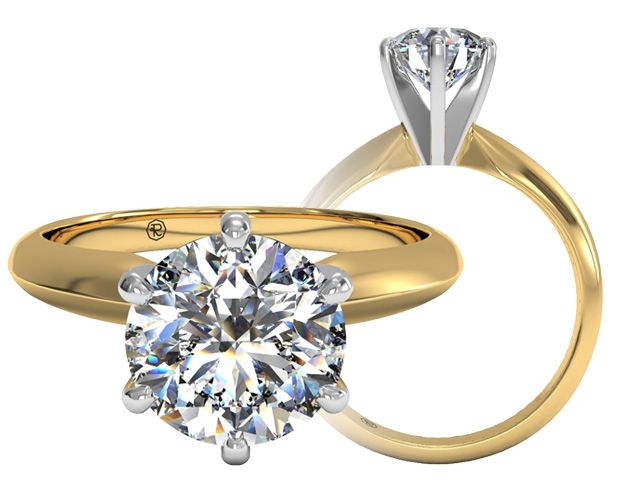
It doesn’t get more classic than this. The elegant knife-edge 18kt yellow gold band will reflect light at an angle, adding more shimmer. A raised 6-prong platinum setting secures the round brilliant diamond, creating the illusion of a larger stone —timeless beauty for the traditional bride.
Refined Simplicity with this Double-Claw Prong Oval Solitaire Engagement Ring
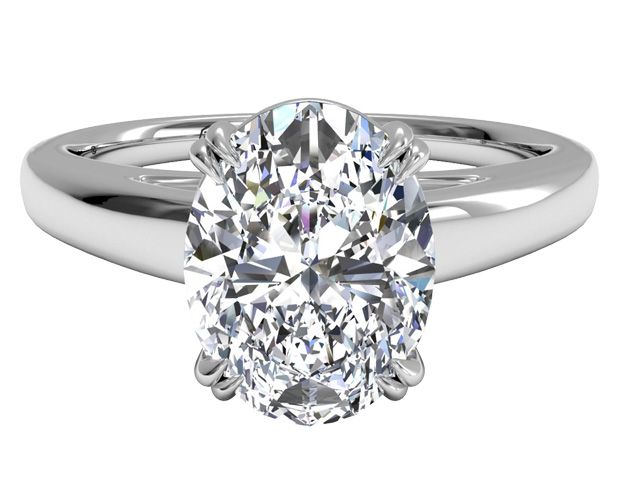
A substantial 18kt white gold band with a beautiful cathedral setting makes for an excellent minimalist engagement ring. An Oval diamond is set in platinum double-claw prongs for maximum strength. Customize this ring with your favorite diamond shape.
A Romantic Rose Gold Solitaire With a Brilliant Detail
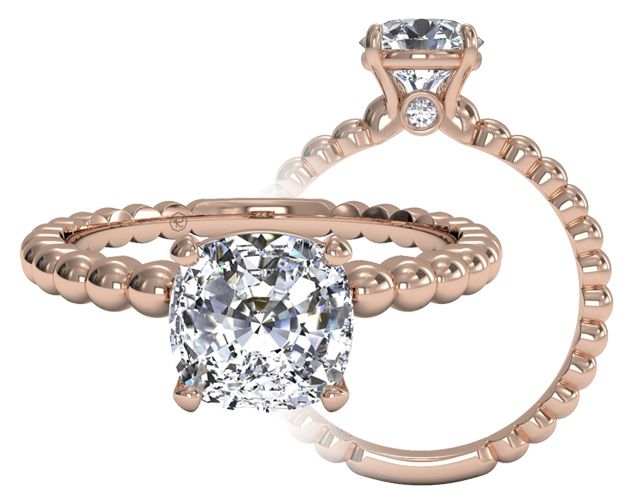
This engagement ring is the proof solitaires can look modern too. A playful, beaded, 18kt rose gold band creates lovely reflections. The 4-prong setting hides two bezel-set round brilliants at each side; a delightful surprise. Also available in yellow or white gold.
Radiant Elegance in Platinum With Crisscross Pavé Diamonds
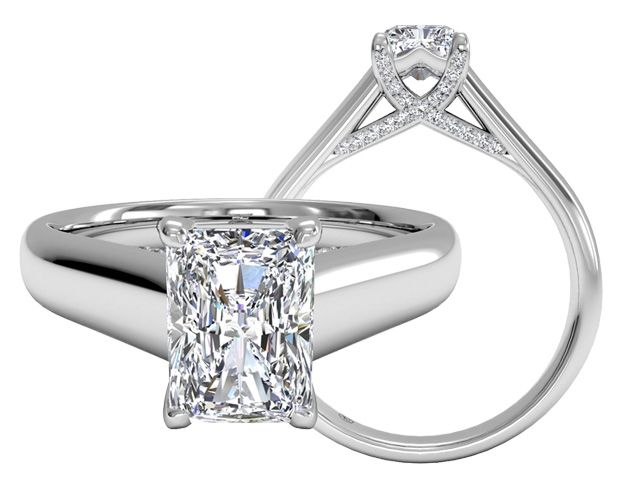
This radiant cut diamond engagement ring features a stunning crisscross pavé detail for more shimmer —A very modern solitaire design for brides who want more brilliance. Customize this ring with your favorite diamond cut.
Shop Now
Luxurious Princess Cut Solitaire Engagement Ring with Embellished Prongs
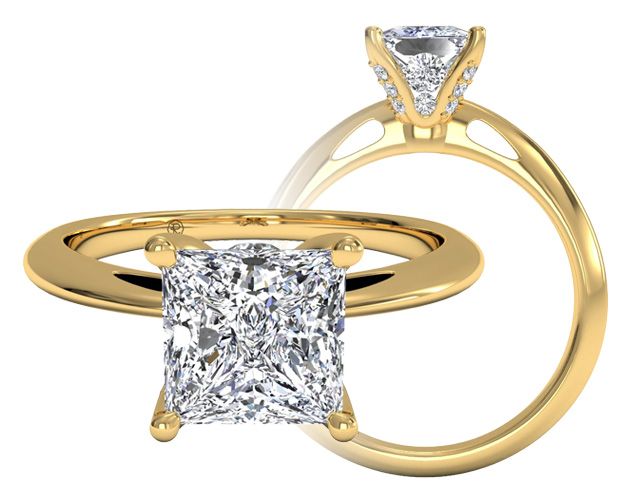
A thin, tapered band in 18kt yellow gold draws all the attention to the princess cut diamond. The apparently conventional setting features four embellished prongs and two channel-set brilliants on each side. This ring is also available with a round cut.
A Modern Heirloom: The Octagonal Set Round Solitaire Engagement Ring
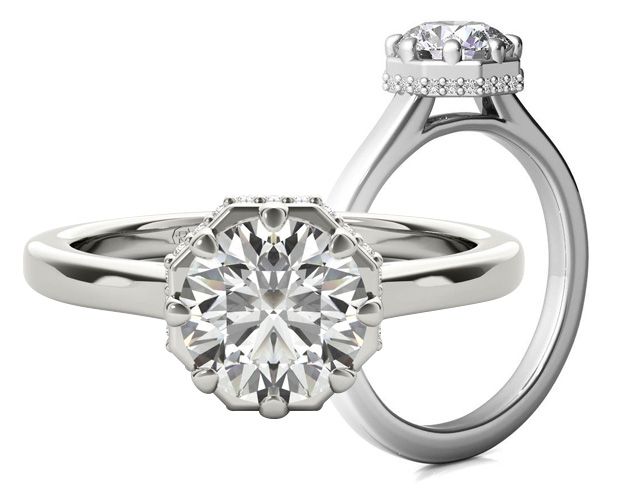
Forget about the solitaire vs. halo dilemma; with this unique geometric design, you can get both! The 18kt white gold octagonal head with 8 prongs will make your diamond appear larger. And the delicately hidden halo border adds extra brightness.


